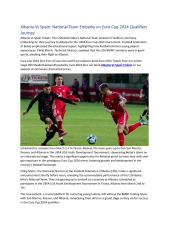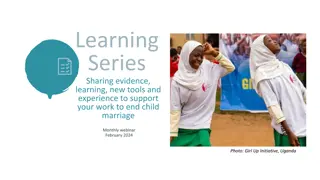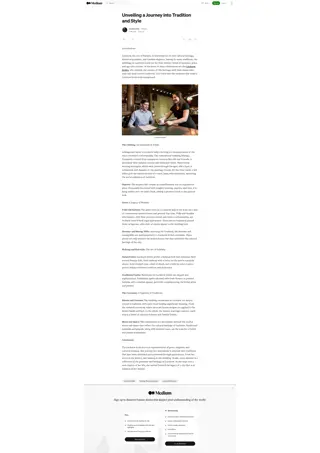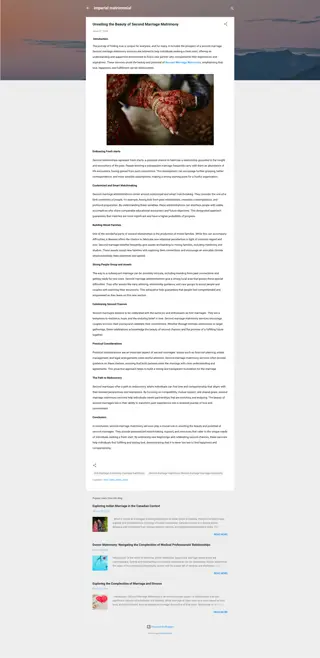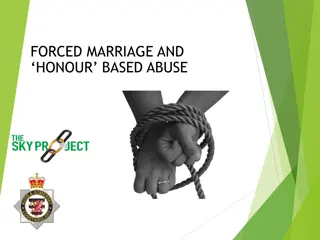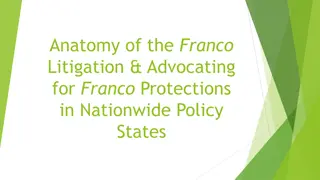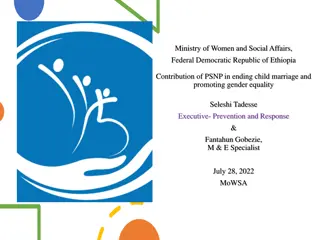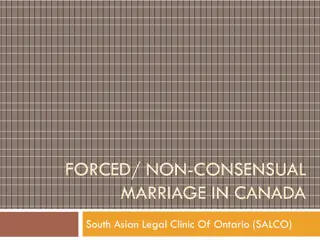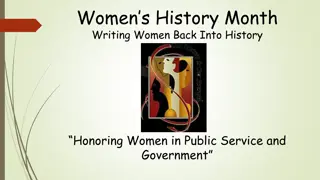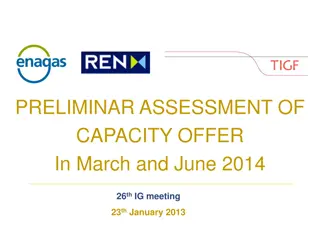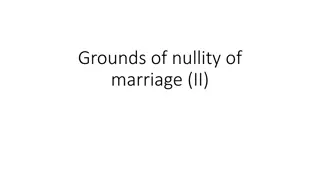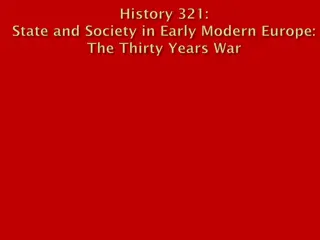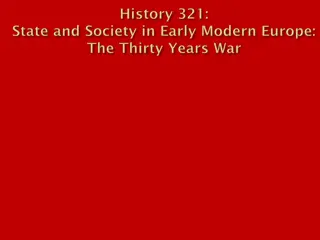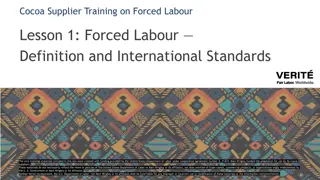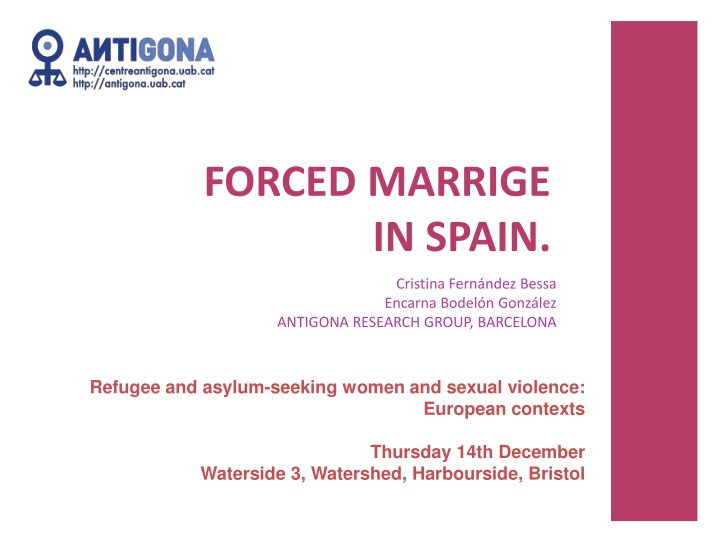
Forced Marriage of Refugee Women in Spain Investigated by Antigona Research Group
Explore the issue of forced marriages impacting refugee and asylum-seeking women in Spain, highlighting the consequences, lack of data, and legal challenges faced. Discover the characteristics of forced marriage cases and the implementation of legal frameworks in this European context.
Download Presentation

Please find below an Image/Link to download the presentation.
The content on the website is provided AS IS for your information and personal use only. It may not be sold, licensed, or shared on other websites without obtaining consent from the author. If you encounter any issues during the download, it is possible that the publisher has removed the file from their server.
You are allowed to download the files provided on this website for personal or commercial use, subject to the condition that they are used lawfully. All files are the property of their respective owners.
The content on the website is provided AS IS for your information and personal use only. It may not be sold, licensed, or shared on other websites without obtaining consent from the author.
E N D
Presentation Transcript
FORCED MARRIGE IN SPAIN. Cristina Fern ndez Bessa Encarna Bodel n Gonz lez ANTIGONA RESEARCH GROUP, BARCELONA Refugee and asylum-seeking women and sexual violence: European contexts Thursday 14th December Waterside 3, Watershed, Harbourside, Bristol
1. FORCED MARRIAGE FM = Arranged marriage against the victim s/survivor s wishes; often a dowry is paid to the family; when refused, there are violent and/or abusive consequences (UNHCR, 2003). Harms related to FM: rape, physical beatings, FGC, etc. Reason for many women to flee their homeland Violation of basic human rights (right to live free from violence, human dignity, free and full consent to marriage, to physical and mental integrity) A form of gender based violence against women A form of gendered persecution should be recognized as a basis for asylum
2. DATA ON FM IN SPAIN No data on prevalence on FM No disaggregated data on different forms of THB No disaggregated data on reasons for recognition of asylum Only official available data: collected by the Catalan Police according to its specific protocol on FM Total cases (Catalonia) <18 >18 2013 26 15 11 2014 10 6 4 2015 15 8 7 2016 14 10 4 2017 (1st semester) Source: Government of Catalonia, Department of Home Affairs 4 1 3
3. CHARACTERISTICS OF FM IN SPAIN. According to Matrifor project fieldwork: FM in Spain usually are Between old man + very young women (even minors). Within members of the same family (cousins or similar relatives). In some nationalities, kinship is not essential but same social class, religion or even the same town or geographical area of the country of origin are important issues. Some interviewed women recognised to be victims of other forms of gender violence apart from FM; such as female genital mutilation or physical, economic and psychological violence. Stakeholders point out that education is one of the most powerful prevention tools access to education = empowerment mechanism for the girls to make their decisions or agreements with their families.
4.1 IMPLEMENTATION OF THE LEGAL FRAMEWORK Civil law (possibility to annul a marriage) almost never applied in cases of FM. Migration law: no specific measures to prevent FM. Moreover, the reunified spouse get a preliminary residence permit (not working permit) that makes her/himself economically and legally depending on her/his husband/wife. Criminal law: from 2015, specific crime on FM (= aggravated from of coercion/THB) yet, victims are hardly identified. Women are reluctant to go to the police and even more to denounce their families. Legislation on GBV: FM is not recognised as a form of gender violence in the Criminal Code. Catalan Law 5/2008, of 24th April, on the right of women to eradicate sexist violence, includes a wide concept of sexist violence FM = community sexist violence Catalan Police Protocol on Prevention and Attention on Forced Marriage, 2009
5. Available resources for FM victims in Spain There are no specific resources for women victims of FM in Spain. Need of specific training to identify/detect FM Only some stakeholders with knowledge on FM sometimes refer these women to the existing services for victims of domestic violence (women s shelters, NGOs, economic support from social services network, etc.). Special difficulties arise when the victim of FM is a minor No specific resources for them. They can only be addressed to the children's protection system. Inexistence of specific shelters for underage girls, victims of gender violence.
6. FM AMD ASYLUM IN SPAIN Asylum Law: Acts of persecution: acts of physical, psychological or sexual violence Among reasons of persecution: gender or sexual orientation , but: according to the circumstances of the origin country Usually, no recognition of asylum, except 1 case (2009) After several denials, recognition by the supreme Court Nigerian women who fled her country after suffering a FGM as a previous step towards coerced marriage arranged by her father with an older and richer neighbour. Gender based persecution for being a woman
6.1. ASR WOMEN COULD BE FLEEING FROM FM? ARRIVALS AT THE SOUTHERN BORDER, SPAIN, 2016
6.2. FIRST TIME ASYLUM APPLICANTS BY CITIZENSHIP AND SEX, SPAIN, 2016 aggregated data (rounded) Venezuela Syria Ukraine Algeria Colombia Female Male El Salvador Honduras Palestine Morocco Nigeria Mali Guinea 40% Pakistan Source: Eurostats 60% Russia China including Hong Kong Iraq Somalia C te d'Ivoire
6.3. BORDER POLICIES By Giorgi Balakhadze - This file was derived from: BlankMap-World6.svgwith additional changes by Giorgi Balakhadze, CC BY-SA 4.0, https://commons.wikimedia.org/w/index.php?curid=56905646
7.1 CONCLUSIONS Many refugee women could be fleeing from a FM and could be at risk to/have suffered related harms (as FGM, physical violence, etc) From the refugee crisis , Spanish asylum protection system has improved, but: Doesn t provide a suitable protection to gendered persecution Lack of specialized services for refugee women needs (specially, forced marriages) It is conditioned by priorities of migration control nationality bias to access to asylum (exclusion of African women) Breach of State responsibilities (according to HR standards) to prevent of and response to sexual and gender-based violence
7.2. CONCLUSIONS REGARDING FM SPAIN NEEDS TO: Train and raise awareness among key legal, educational, political, health, social and community agents + women and girls Collect data on FM Design and implement public policies (that can be assessed and accounted for) Create educational, social, legal, health and community services to prevent FM Recognize asylum to women victims/survivors of FM Create specialized protection services for women victims/survivors of FM (also for ASR women)


